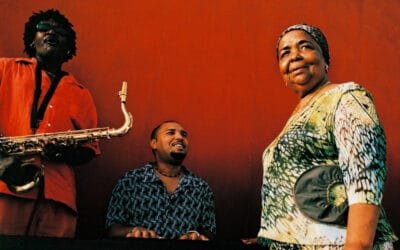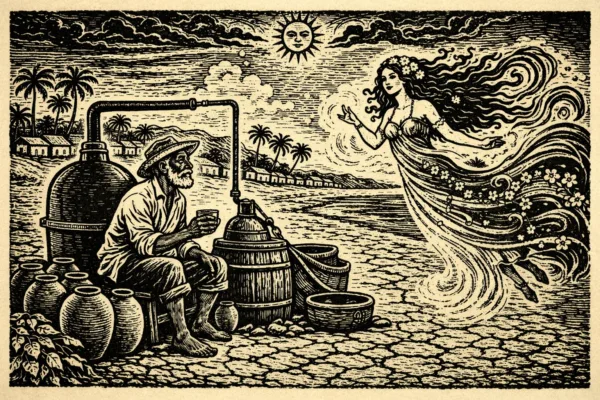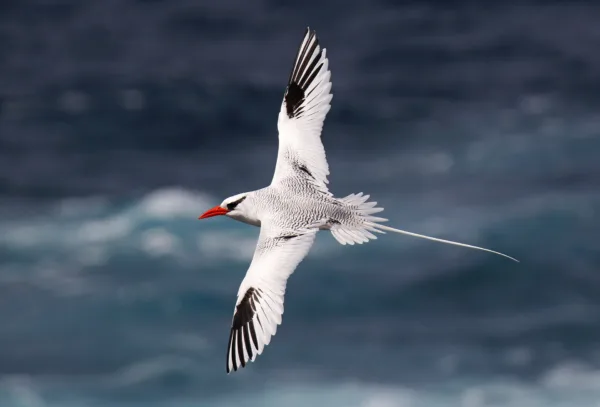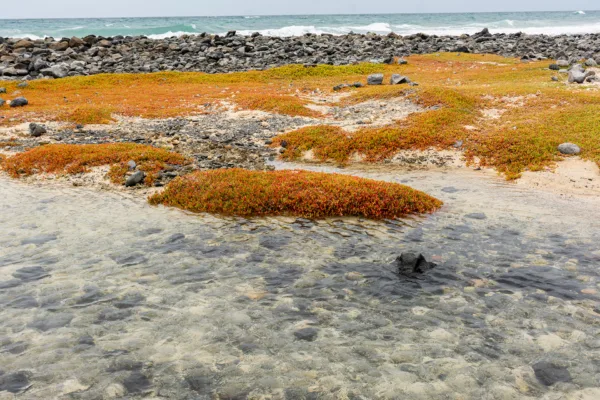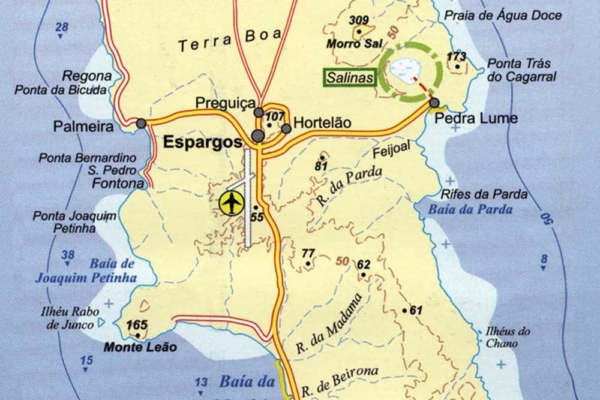Tcheka: Great Singer and Guitar Virtuoso from Cape Verde
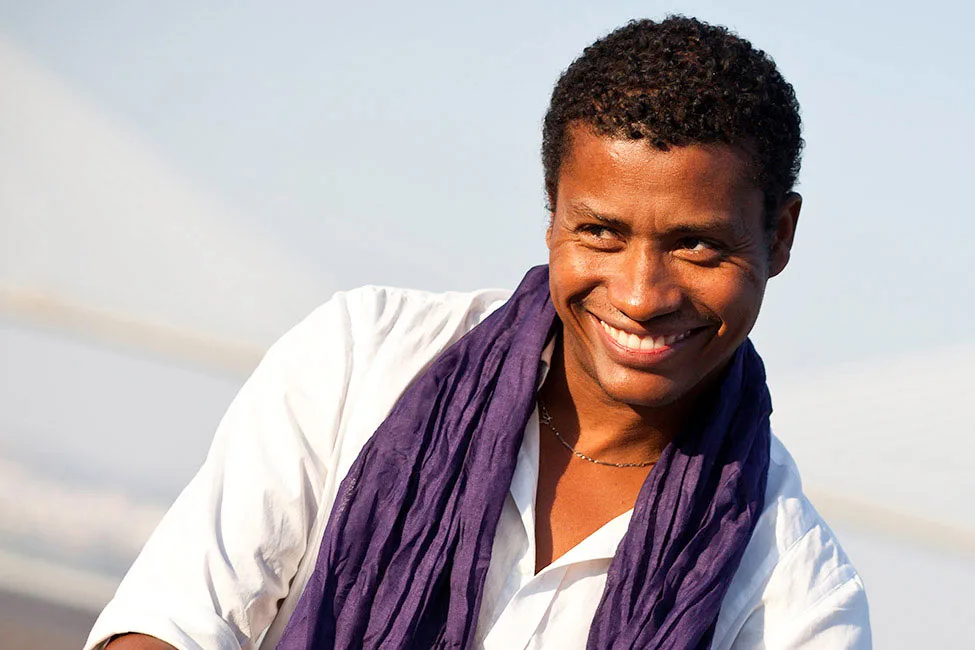
The Fisherman’s Son Who Became a Star
At the age of eight, Manuel Lopes Andrade learned to play the guitar under duress. His father, the renowned violinist Nho Raul Andrade, forced him into the family band, which played weddings, funerals, and baptisms around their small town of Ribeira da Barca on Santiago Island. By nine, he was performing alongside his siblings under his father’s stern direction.
The boy who would become Tcheka spent his teenage years fishing and diving along the jagged coast of Santiago, surrounded by the ominous shapes of the Serra Malagueta Mountains. His secondary education ended early — his family couldn’t afford the fees. But those years by the sea, composing songs between fishing trips, shaped the artist who would later win international acclaim as Cape Verde’s most innovative guitarist.
Today, at 52, Tcheka performs solo concerts at Lincoln Centre, collaborates with South African guitar masters, and has released five critically acclaimed albums. His near-orchestral approach to acoustic guitar transforms traditional Cape Verdean music into something entirely new, earning him the Radio France International Award for World Music Artist of the Year and recognition as a vanguard of contemporary Cape Verdean sound.
From Family Band to Television Cameraman
Tcheka’s musical education began with traditional Cape Verdean genres — morna, coladeira, the same music that made Cesaria Evora famous worldwide. He started with cavaquinho and traditional viola before transitioning to the Portuguese-adapted guitar. By the age of 15, he was developing his own style, incorporating batuku rhythms — traditionally played by women sitting in circles, beating makeshift drums — into his guitar work.
Like many young Cape Verdeans, he left his rural hometown of Santiago for the capital, Praia, in search of opportunities. He found work as a cameraman for national television, a job that would prove crucial to his later artistic development. At work, he met journalist Júlio Rodrigues, who became his songwriting collaborator and with whom he performed informally in Praia’s bars. It was during these small gigs that Tcheka was developing his original style and the sound that would eventually fill concert halls across Europe and America.
Working in television exposed Tcheka to different forms of storytelling and visual composition — influences that later shaped his approach to musical narrative. His songs became mini-films, complete with character development and atmospheric detail.
The Studio Learning Curve
Tcheka recorded his first album, “Argui” (Get Up), in 2003 with Lusafrica Records. The experience nearly crushed his confidence. He recalls:
“I did not enjoy the studio at all at first. I had no idea what to do with anything, the microphones, any of it. And then the pressure from the producer. You think, ‘OK, this person has more experience.’ And so you let them do it, and then I kind of lost control over my own art.”
Despite his studio struggles, “Argui” established his reputation in Cape Verde as a guitar virtuoso and original songwriter. The album’s success forced him to become a full-time musician, leaving television work behind.
His confidence grew with the release of his second album, “Nu Monda” (Let’s Weed), in 2005. Brazilian acoustic rock star Lenine produced the record, helping Tcheka find his voice in the studio. The album catapulted him into the stratosphere of world music, sparking conversations about him being the true vanguard of Cape Verdean music.
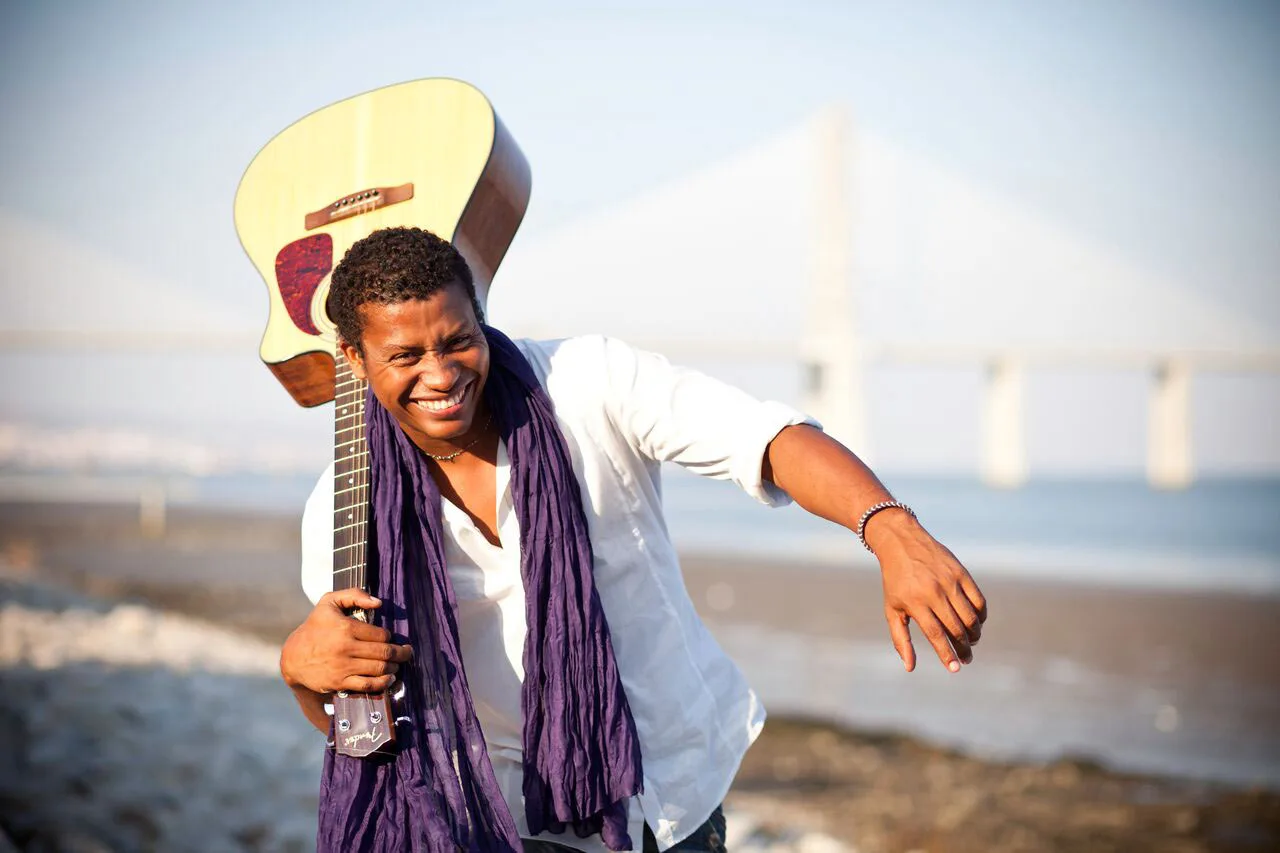
International Recognition
The breakthrough came in 2005 when Tcheka entered the prestigious Radio France International “Découverte Musiques du Monde” Competition in Dakar, Senegal, competing against leading contemporary African artists. He returned to Cape Verde with first prize and, finally, national and regional stardom.
“Nu Monda” earned critical acclaim worldwide. Music critics struggled to categorise his sound — it referenced multiple Cape Verdean genres while incorporating Caribbean, Brazilian, and African elements alongside folk, jazz, blues, and rock. “It is never just Santiaguense, never just Cape Verdean, and never just music,” one critic wrote.
The album led to performances across Europe, as well as to a featured spot at the World Music Expo (WOMEX) in Seville, Spain. His career gained momentum with subsequent releases: “Lonji” (meaning “Far Away”) in 2007, “Dor De Mar” (meaning “Sea Pain”) in 2011, and “Tcheka Mix” in 2016.
Going Solo
By 2017, Tcheka had reached a creative crossroads. After years of touring with his five-piece band, he wanted to showcase a different side of his artistry. His fifth album, “Boka Kafé,” captured him as a solo performer — just voice and guitar, recorded live in Lisbon without the use of studio tricks.
“I didn’t want to get stuck always playing the same thing with the band,” he explains. “An artist has always to be evolving and trying different things. So I wanted to show a different facet of what I do, without losing my originality.”
The solo format revealed the full scope of his guitar mastery. His playing is near-orchestral, bursting with rhythm, robust bass lines, and delicate melodies that create a stage for his dry, slightly raspy voice. Audiences could finally hear the intricate bass work that sometimes got lost in band arrangements.
“Boka Kafé” featured songs about the volcanic beauty of Fogo Island and the anxiety of fishermen’s families waiting for their return. For the first time, he included compositions by other writers alongside his own, demonstrating his openness to collaboration while maintaining his distinctive style.
Collaborations With Other Artists
Tcheka’s international profile opened up opportunities to collaborate with artists from far beyond Cape Verde. In 2015, he began collaborating with South African guitarist Derek Gripper, taking their partnership to festivals across Africa, including the Busara Festival in Zanzibar, HIFA in Zimbabwe, and the Cape Town World Music Festival in South Africa.
The collaboration with Gripper — known for his classical guitar interpretations of African kora music — pushed Tcheka into new experimental territories. Both guitarists share an ability to make a single instrument sound like a full orchestra, creating a natural musical dialogue.
He also worked with Portuguese star pianist Mário Laginha, who produced “Boka Kafé” and joined him for concerts that remain unreleased as recordings. These collaborations demonstrated Tcheka’s ability to adapt his Cape Verdean foundation to different musical contexts without losing its essence.
The Pantera Generation
Tcheka emerged as part of what critics call the “Pantera Generation”. It’s named after the influential composer Orlando Pantera, who died in 2001, before he had a chance to record his debut album. Along with Lura, Mayra Andrade, and Princezito, Tcheka represents a new wave of Cape Verdean artists who honour traditional forms while embracing global influences.
Like Pantera, Tcheka specialises in adapting batuku to guitar. The traditionally female genre involves women sitting in circles, beating cloth bundles as drums while improvising verses about village life. Tcheka transposes these polyrhythmic patterns to guitar, creating what was once called “an entirely new vision of what it means to be Creole in the age of globalisation.”
His music bridges Cape Verde’s African heritage with contemporary global sounds. Unlike older generation artists who focused primarily on morna and coladeira, Tcheka draws from Santiago’s most African-influenced genres — batuku, funana, and finason — while incorporating elements from across the musical spectrum.
Musical Philosophy
Tcheka’s approach to Cape Verdean music reflects deep cultural understanding combined with artistic restlessness. He views his homeland’s music not as a museum piece to be preserved unchanged, but as a living culture that must evolve to remain relevant. One critic said:
“Perhaps what Tcheka presents is an entirely new vision of what it means to be Creole in the age of globalisation. To be a hybrid product of the historical forces of slavery, colonialism and national independence, but at the same time, to be deeply affected by post-modern forces — by travel and trans-national encounters, by new regimes of knowledge, art and capitalism and by the increasing inseparability of technology and human imagination.”
His compositions blend traditional storytelling with some of the contemporary concerns. Songs address everything from environmental beauty to urban anxiety, from conventional fishing life to modern telecommunications. The titles of his songs — “Telemovel” (Mobile Phone), “Lingua Pretu” (Black Tongue), “Primeru Bes Kin Ba Cinema” (First Time Going to Cinema) — reflect Cape Verde’s rapid social transformation.
Technical Innovation
Tcheka’s guitar technique sets him apart from other Cape Verdean musicians. His fingerpicking style creates multiple layers simultaneously — bass lines, rhythmic patterns, and melodies that would typically require the work of several musicians. Music critics consistently praise his ability to make one guitar sound like a full band.
He plays a Taylor 712 acoustic guitar, though he’s quick to note that the instrument matters less than the technique. His approach incorporates techniques from classical, flamenco, Brazilian, and African guitar traditions, creating a hybrid style that supports traditional Cape Verdean vocal techniques while pushing them into new territory.
The percussive elements in his playing reflect his deep understanding of batuku rhythms. He uses his guitar as both a melodic and percussive instrument, tapping and striking the body to recreate the polyrhythmic complexity of traditional women’s music.
Tcheka Today
At 52, Tcheka continues touring internationally, bringing Cape Verdean music to new audiences worldwide. In 2017, his tour following “Boka Kafé” included major music venues across the United States, Europe, and beyond. He played in places such as Jazz in Marciac, Lincoln Centre, and the Chicago World Music Festival.
His most recent album, “SPERA MUNDO,” released in 2025, continues his exploration of solo acoustic performance while incorporating new compositional elements developed through his international collaborations.
Despite his global success, Tcheka remains connected to Santiago’s musical community. He regularly returns to Cape Verde to participate in local festivals. He also mentors younger musicians. It’s worth noting that Tcheka’s presence in Cape Verde’s capital contrasts with that of many successful Cape Verdean artists who relocate permanently to Europe or America.
Deeper Meaning of Tcheka’s Music
Tcheka’s success demonstrates how traditional music can evolve without losing its essential character. His work addresses one of the central challenges for Cape Verdean culture: how to maintain African-rooted traditions while engaging contemporary audiences worldwide. Unlike some world music that exoticises traditional forms for Western consumption, Tcheka’s music treats tradition as living culture capable of growth and transformation.
Young Cape Verdean musicians increasingly look to his example, seeing how technical excellence and cultural authenticity can coexist with international success. His innovative guitar work has influenced and inspired many other Cape Verdean instrumentalists to blend traditional rhythms with contemporary techniques.
Cape Verdean Paradox of Success
Tcheka faces the same paradox that challenges many Cape Verdean artists: greater recognition abroad than at home. While he fills concert halls in Europe and America, Cape Verde’s local music scene often prioritises other genres over traditional-influenced music. He notes:
“From my point of view, the majority of people in Cape Verde don’t really consume that music. Not my music. Nor Cesaria’s music. She’s more known outside, even though she’s a symbol there. But the music that they consume is not that.”
This disconnect reflects broader cultural tensions in Cape Verde, where globalisation has created generation gaps in musical taste. Younger Cape Verdeans often prefer zouk, hip-hop, and other contemporary genres over the traditional forms that earn international acclaim.
Legacy in Progress
At 52, Tcheka represents the maturation of post-independence Cape Verdean music. Born six years after national independence, he grew up in Cape Verde, helping to define its cultural identity while connecting to the broader African diaspora and global community.
His career demonstrates how individual artistic vision can reshape entire musical traditions. By refusing to treat Cape Verdean music as a fixed tradition, he’s opened space for continued innovation while maintaining cultural authenticity.
The boy who learned to play the guitar under his father’s stern guidance has become a cultural bridge-builder, connecting Cape Verde’s African roots with contemporary global music. His concerts introduce international audiences to Cape Verdean culture while showing Cape Verdean musicians new possibilities for their traditional forms.
Tcheka’s story continues unfolding, with new collaborations and creative projects keeping his music fresh. For an artist who believes that staying static means artistic death, the future promises continued evolution of a sound that remains uniquely Cape Verdean, yet speaks the universal language of music.
Bibliography
- Cape Verde’s Tcheka Makes His U.S. Debut at Lincoln Center, Afropop Worldwide, 2017;
- Tcheka, Djô da Silva, Cabo Verde a Música;
- Tcheka (Cape Verde), SIFA 2018, Singapore International Festival of Arts;
- Tcheka, Cesária Évora and Music of Cape Verde, Wikipedia;
- Tcheka on Bandcamp.
